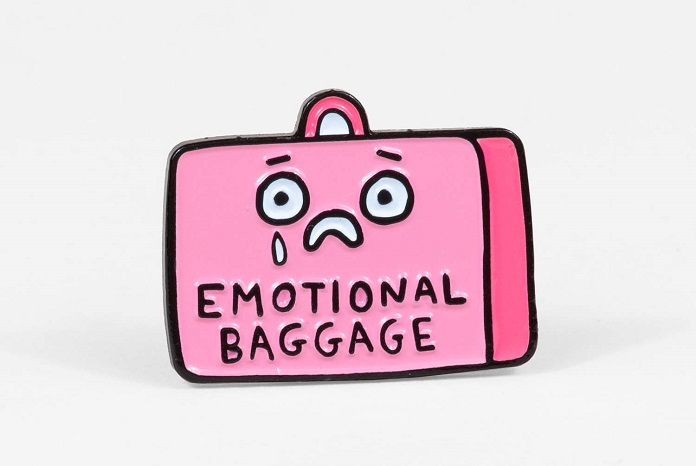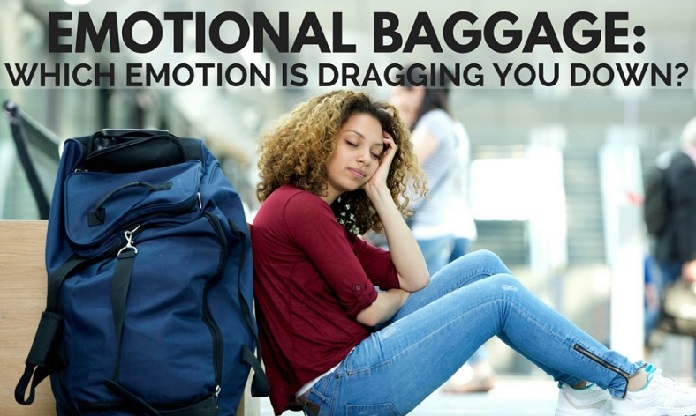What Exactly Is Emotional Baggage?
In its broadest sense, emotional baggage is best described as the unbearable weight of unsettled feelings which could have been generated from childhood, past, or even present experiences. These will eventually tend to have a strong negative influence on present thinking patterns, value systems, behavior, attitudes, and relationships. Research also shows that a lot of people are of the opinion that emotional baggage keeps them stuck in old habits and the aftermath of being stuck in old habits is having to carry heavier emotional baggage. However, it is also believed that emotional baggage does not necessarily result from the bad or negative occurrences, but from one’s negative perception and processing of different experiences be it good or bad.
Possible Causes of Emotional Baggage
Emotional baggage is something that everyone can relate to because we all can attest to the fact that we have faced a couple of bad experiences at a certain time in our lives. However, the difference is that while some people have mastered the art to control their emotions and move on after a bad experience, others have not and this will mean that they are constantly saddled by the burden of their emotional baggage. There are also a plethora of reasons why people live with the downside of carrying the weight of emotional baggage and some of such reasons are:
Betrayal from a close friend or loved one which can lead to developing a lack of trust for almost everyone around you A broken home, divorce, or separation of parents usually leads to fear of committing to relationships Rejection- either due to their perspectives of life or their inability to meet the standards set by other people Loss of loved one A negative upbringing – this leaves its imprints in so many adverse ways which may include a lack of love, attention, and care from family Series of failed relationships and heartbreaks
Are There Different Types Of Emotional Baggage
Emotional baggage is actually a metaphor used to describe a wide range of traits people exhibit to reflect the inner emotions that weigh them down. Although the list is quite a lengthy one, we have been able to bring it down to 5 and they are:
Bitterness: This attribute makes a person a very unpleasant one to be around and many a time it results from holding grudges against others who may or may not know that they have offended you. Fear: A person who lacks the boldness to carry out certain legitimate actions may be exhibiting such timidity due to bad experiences in the past when he/she has either been ridiculed for acting or failed at accomplishing a certain feat. These are however not the only reasons one can be trapped in fear as several other occurrences can trigger this emotion. Guilt: A guilty person is usually saddled with a lot of worry and unhappiness because they feel responsible for a certain misfortune that had happened to another person. For instance, one can be saddled with guilt from a past relationship because they had cheated on their partner and refuse to forgive themselves for the failed relationship. More so, if a family member you had quarreled with passes on without you patching things up, this can be very traumatizing and the feeling of guilt can constantly plague you. Anger: Anger outbursts are a typical form of emotional baggage people tend to exhibit and it ranks among the most popular type. In most cases, such people who have had bad experiences about certain things or people in the past tend to lose their cool when they sense a repetition of the same ordeal later on. In such a situation, the only they might want to react to the situation is via anger outbursts. Regret: Many people who carry the emotional baggage of regret tend to feel sad about something they must have done or said in the past. Their wrong actions or words usually cost them certain opportunities they might have enjoyed if they had behaved in a better way. So whenever that thought comes to mind, it will trigger the feeling of regret.
How To Recognize If You Are Saddled With An Emotional Baggage
We all have our emotional flaws and carrying emotional baggage can be glaring for many people to spot. However, there are times when the person with such a weight that affects their behavior might actually be ignorant of the fact that they act the way they do because of their past experiences, and at these times, they fail to recognize it until someone points it out for them. If you hereby need precise indications that you are saddled with any emotional baggage check out the clues below:
1. You Feel Insecure
Lack of confidence and constantly comparing yourself with others can be a sign of having emotional baggage. It makes you needy and clingy – that is, constantly desiring the approval of people. So, whenever you start to see yourself as inadequate, not good enough, threatened by the success of others, anxious about yourself and your relationships, you might be holding on to negative experiences in the past.
2. You Compare Your Past Relationships With The Present One
If you are out of a relationship and you find it difficult to connect with your new partner instead, you constantly compare your present relationship with the former, you probably have emotional baggage. This is an indication that you are still holding on to the past and denying yourself and your new partner the freedom to explore friendship, and romance.
3. Being Paranoid
Past experiences like kidnap, physical or sexual abuse, etc may make one extremely, unduly suspicious, and afraid of people. Such a person might always feel like a victim, easily get offended, defensive, hostile, and aggressive. This is largely due to the fact that they find it difficult to confide in people about their ugly experiences nor forgive those who had hurt them. If you currently exhibit either or all of those signs, it shows that you still have unresolved feelings from your past experiences.
4. Emotionally Instability
You have emotional baggage if you constantly have fluctuating feelings and chronic mood swings. This means one minute you are happy, and the next moment you are sad and feel rejected. This instability of emotions might have resulted from childhood trauma, illness, loss of a loved one, etc.
5. Commitment Issues
Emotional baggage makes it difficult for one to commit to people, and it has also been proven that it hinders your productivity at the workplace; unlike emotional intelligence which allows you to soar at anything you do. From a general perspective, someone with commitment issues is restricted from going into anything that places a demand on them to give and invest their time or resources due to fear of being hurt or betrayed.
How Does Emotional Baggage Affect Relationships?
Relationships come with their demands and people with the emotional baggage of any kind tend to do badly at them because they have very poor interactions with people. This is due to the fact that their emotional load hinders them from building thriving relationships. Some of the key ways emotional baggage affects relationships include the following:
1. It Hinders Intimacy
Relationships thrive on forging a strong bond with your partner and this makes you share all your moments of joy and even hurt together. However, when you are saddled with emotional baggage, there will always be a restriction on how you relate with your partner because of your personal struggles and this will hinder you from enjoying intimacy in the relationship. In most cases, it appears to be like a high wall, or barrier stopping couples from experiencing closeness. For you to hereby enjoy friendship and romance with your partner, letting go of past hurts and fears is the only way out.
2. It Triggers Disrespect
The habit of constantly using other people or even an ex-partner as your standard in a relationship against which you assess your new partner will definitely frustrate the person. Simply put, making comparisons is an act of disrespect and being unfair to your new partner because it will end up making your partner feel worthless which will definitely deprive you of having a happy relationship.
3. It Makes The Relationship Toxic
Being excessively needy and clingy is a toxic and unhealthy habit. As much as a relationship is a place of sharing love and being there for one another, it is wrong to totally depend on one’s partner for friendship, love, care, and support because of your ugly past experiences. Your partner needs and deserves their space, they need to also interact and connect with other people, so do you.
4. It Can Result In Heartbreak
No one wants to be with people who hold on firmly to their past and allow their decisions and actions to be affected by their negative experiences. People who let their emotional baggage get the better of them around their partners is a warning sign in any relationship and as soon as your unwillingness to let go is detected, such a relationship will come to an abrupt end and this will lead to heartbreak.
Practical Steps To Effectively Manage Your Emotional Baggage
Life is a journey in which things happen, some good and some bad. It is not possible to live a life free of hurts because it is just human to err. However, you will be doing yourself a big favor to brush off the bad experiences, pick the lessons and move on to create happier moments! So if you have been struggling with any type of emotional baggage, it’s high time you dropped that weight and move on to living a more fun-filled life. We have compiled a couple of practical steps to get you started on the process:
1. Admit it
The first step to solving a problem is admitting that there is a problem. You should hereby be honest that you need help and this will prompt you to go for counseling or adapt any type of strategy that will boost your emotions. More so, beyond seeking help, admitting that you need to effectively manage your emotional baggage will make you take daily intentional steps to effect the required changes.
2. Forgive Yourself And Others Who Hurt You In The Past
No matter the gravity of what was done in the past, it cannot be changed, this is a reality that you must accept. You may not have the ability to undo what has been done but you can make the right choices in the present to give yourself a better today and a brighter future. To achieve this, you need to get your emotions right and this starts by forgiving yourself and forgive others who contributed to giving you a bad experience.
3. Avoid Being Isolated
As much as possible thrive to stay out of isolation – suicidal thoughts, anxiety, fear, resentment, and bad habits all thrive in isolation. Learn how to make friends and stay in touch with people in order to keep the flow of communication intact.
4. Surround Yourself With Positive People
The people you hang out with matters as they can assert a great influence on you. If your close circle they are people who have learned to let go of their excesses and control their emotions, you can easily learn to do the same by associating with them.
5. Be Accountable
It is important to have people in your life that know what is happening to you and they may be mentors, spouse, family members, or even friends. Such persons can help you through your tough times and keep you in check in terms of handling your emotional baggage.





